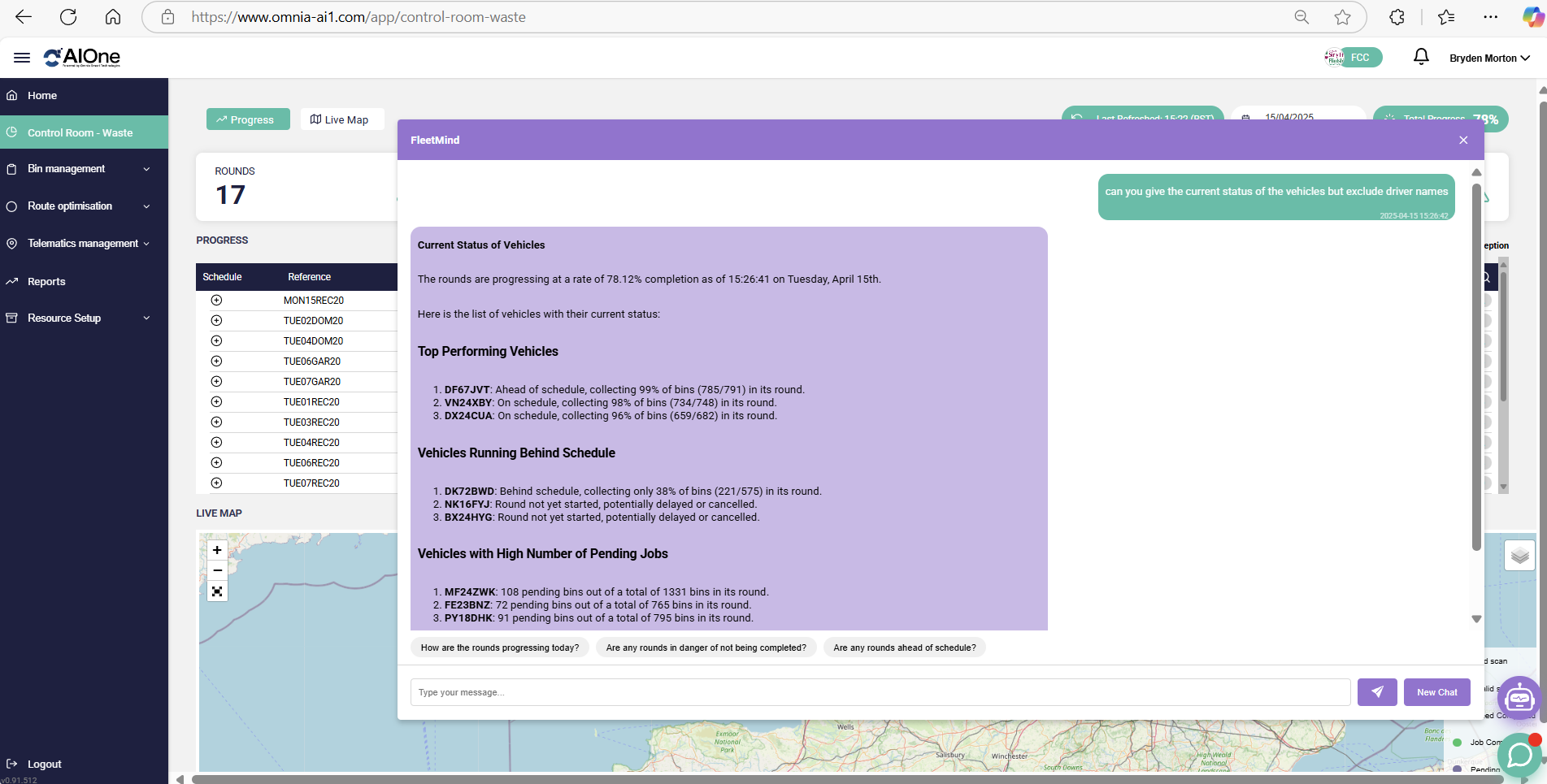The FleetMind solution essentially simplifies complex operational environments. FleetMind leverages open-source AI models hosted in-house, allowing for seamless integration with different hardware and systems. Data is pulled in from multiple sources, including historical information, live traffic flow data, and GPS tracking of fleet vehicles. The AI models generate real-time recommendations and provide automated notifications to support the human operators to make informed decisions quickly and efficiently.
For example, for a local council garden waste collection service, RFID tags on garden waste bins helps operatives identify whether residents have paid for the service as they proceed along their route. This real-time data integration ensures that operations run smoothly and efficiently. Fleet managers can select from pre-defined queries, or ask questions of FleetMind in natural language, in response to various operational challenges as they arise during a working day. FleetMind processes millions of data points and presents its feedback in a language that makes sense to the person asking the question. The solution transforms data into meaningful information, aiding decision-making, significantly reducing manual processes and improving operational efficiency
FleetMind is the output from an InnovateUK funded competition is to support the development and adoption of Artificial Intelligence (AI) and Machine Learning (ML) solutions in priority sectors, including commercial transport.
The challenge
The FleetMind project sought to address a pressing need in the logistics and supply chains sectors, through the application of AI and ML technologies. The current state of fleet management, particularly in local authorities, reveals significant opportunities to improve resource utilisation. These are manifested in manual processes, fixed route planning, and lack of real-time operational visibility. Data is fragmented and hard to integrate. Existing systems are not always user-friendly. Investment in change is difficult to justify. In the waste management sector, all of these challenges are compounded and amplified by the need for real-time operational decisions in a high-stress environment.
FleetMind aimed to remedy these shortcomings by offering a solution that integrates real-time data analytics with AI-driven decision-making capabilities, to provide cost efficiency, optimal resource utilisation and environmental stewardship.
The anticipated outcomes
The project set out to develop a new solution for trial, and quantify the solution's tangible benefits for local councils, their operations, and the general public. These were identified as:
- Cost Efficiency: Streamlining waste collection operations is expected to lead to substantial cost savings. The resulting fiscal space could be reallocated to other vital municipal projects or potentially lead to a re-evaluation of waste collection tariffs for residents and businesses.
- Optimal Resource Utilisation: continuous data-driven adjustments will result in a more informed distribution of waste collection assets, whether it’s manpower or machinery, leading to higher service standards and better coverage.
- Environmental Stewardship: by reducing unnecessary vehicular movement through optimal routes and schedules, to reduce the carbon footprint of waste collection operations, aligning with the broader objective of environmental preservation and sustainability.
Project scope
The project began by taking a deep dive into the issues by working with waste management providers to understand the precise ways in which the solution needed to improve business productivity and efficiency in this priority sector.
This project was delivered in partnership with Flintshire County Council and Cumberland County Council.
For the next phase of the project, Omnia partnered with TRL and Hodos Media, set out to create a system that integrates multiple data sources and management systems, and uses AI and Machine Learning to generate real-time insights and recommendations. This system, called FleetMind, improves timely decision-making in waste management control rooms and reduces the stress on human operators.
Key considerations for the development of FleetMind were assurances of data security, adaptability and scalability. One local authority already had Omnia developed digital systems in place to support their waste management services an all-in-one platform called AIOne . AIOne integrates job and vehicle management, route optimisation, and asset management. For the other council, FleetMind, was integrated with another provider’s software to demonstrate that it can be used across local operations regardless of their data collection tools. FleetMind can be hosted on premises or in the cloud. This flexibility allows councils to integrate FleetMind with their existing systems without the need for significant technology overhauls.
FleetMind: how it works
The FleetMind solution essentially simplifies complex operational environments. FleetMind leverages open-source AI models hosted in-house, allowing for seamless integration with different hardware and systems. Data is pulled in from multiple sources, including historical information, live traffic flow data, and GPS tracking of fleet vehicles. The AI models generate real-time recommendations and provide automated notifications to support the human operators to make informed decisions quickly and efficiently.
For example, for a local council garden waste collection service, RFID tags on garden waste bins helps operatives identify whether residents have paid for the service as they proceed along their route. This real-time data integration ensures that operations run smoothly and efficiently. Fleet managers can select from pre-defined queries, or ask questions of FleetMind in natural language, in response to various operational challenges as they arise during a working day. FleetMind processes billions of data points and presents its feedback in a language that makes sense to the person asking the question. The solution transforms data into meaningful information, aiding decision-making, significantly reducing manual processes and improving operational efficiency.

The demonstration of FleetMind
FleetMind demonstrated how it delivers cost efficiencies via enhanced decision-making. Using FleetMind, fleet operators spend less time on manual data analysis and rationalising selected courses of action. Operators can ask specific questions in response to real world situations, such as which vehicle can assist another to complete a route, and receive instant recommendations based on real time data. This functionality helps streamline operations, allowing operators to make quick, informed decisions, with certainty of outcomes. This reduces stress on the control room operators. Additionally, operators can execute these decisions directly through FleetMind, re-tasking and re-routing vehicles immediately, further simplifying the process.
The FleetMind demonstration also showed how it delivers the desired benefits for strategic decisions about optimising fleet usage. For example, operators can ask for a financial assessment of the impact of removing a vehicle from the fleet on overall costs and operations. This would aid with planning vehicle maintenance regimes, and recommending when to replace a vehicle. While the current focus of the solution is on operational efficiency and the environmental impact of specific vehicles in their duty cycles, FleetMind has the potential to integrate financial data about different vehicle types and models by merging historical data and OEM sales data. This would provide fleet managers with comprehensive insights to evaluate the comparative cost-effectiveness of vehicle replacements on the performance of the whole fleet.
TRL's role
TRL, as the RTO for the project, was to assess and validate the operational benefits of FleetMind. TRL also led and provided the structure and tools for comprehensive stakeholder engagement to ensure buy-in from all participants.
TRL fleet decarbonisation methodology - ECO Stars - was used as the proven assessment method for validating the environmental impact of the fleet from the perspective of a county council, providing the platform to make comparison between the current waste collection methodology with the operationally AI enhanced methodology.
Future developments
FleetMind now lives within the planning room/ control room module of AIOne to aid supervisors in their day to day decision making. FleetMind can however be implemented as a standalone module which can be integrated with any existing software should a customer require this. Looking ahead, Omnia are working on enhancing the FleetMind solution to include generative AI capabilities. This will enable FleetMind to perform tasks autonomously, further reducing the operational burden on human operators. The goal is to support and streamline decision-making, not replace it, ensuring that operators have the time and clarity to focus on other critical aspects of their work.
Want to learn more?
For more information about FleetMind as a commercial solution, please contact Omnia directly.
To find out more about ECO Stars to support fleet decarbonisation goals, please head over to the ECO Stars website.

